 Petzlover
Petzlover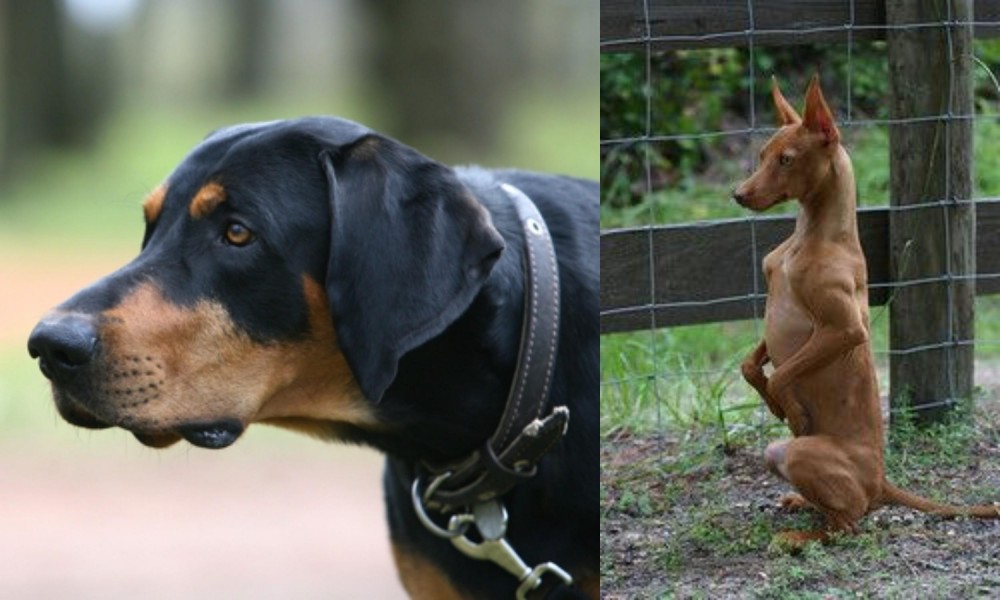 Lithuanian Hound is originated from Lithuania but Podenco Andaluz is originated from Spain. Lithuanian Hound may grow 8 cm / 4 inches higher than Podenco Andaluz. Lithuanian Hound may weigh 10 kg / 23 pounds more than Podenco Andaluz. Both Lithuanian Hound and Podenco Andaluz has almost same life span. Lithuanian Hound may have more litter size than Podenco Andaluz. Both Lithuanian Hound and Podenco Andaluz requires Low Maintenance.
Lithuanian Hound is originated from Lithuania but Podenco Andaluz is originated from Spain. Lithuanian Hound may grow 8 cm / 4 inches higher than Podenco Andaluz. Lithuanian Hound may weigh 10 kg / 23 pounds more than Podenco Andaluz. Both Lithuanian Hound and Podenco Andaluz has almost same life span. Lithuanian Hound may have more litter size than Podenco Andaluz. Both Lithuanian Hound and Podenco Andaluz requires Low Maintenance.
 This attractive dog hails from Lithuania.This is an old dog breed that has been used as a hunting dog.
This attractive dog hails from Lithuania.This is an old dog breed that has been used as a hunting dog.
It is believed that this dog dates way back to the 16th century and that it was developed from the mixing of hound breeds – Bloodhounds, Beagles, Polish Hounds and Russian Hounds.
The numbers of the dogs decreased and in the late 1970s, the Lithuanian Cytological Council developed a kennel facility for restoring Lithuanian Hound numbers, and a standard was also written. This breed is rare and is not usually found outside the Republic of Lithuania.
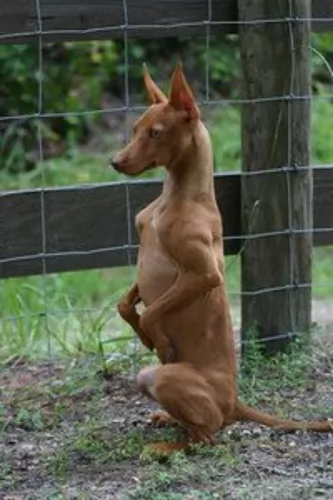 The Podenco Andaluz hails from the Andalusian region of southern Spain. It is believed that this dog is likely to have descended from the European hunting dog.
The Podenco Andaluz hails from the Andalusian region of southern Spain. It is believed that this dog is likely to have descended from the European hunting dog.
Because of the lack of distinctive characteristics, and also the similarities the dog shares with other dog breeds, the dog isn’t typically recognized in its own right. They have always been used as hunting dogs. The Andaluz is actually one of the lesser known Podencos and it isn’t recognized by the FCI.
 The Lithuanian Hound is a medium-sized dog which stands at between 53 - 61 cm in height and weighs between 27 to 32kg.
The Lithuanian Hound is a medium-sized dog which stands at between 53 - 61 cm in height and weighs between 27 to 32kg.
He is a well proportioned, sturdy dog, heavily boned and muscular with straight, strong legs. The coat of the dog is short, smooth and essentially black with some tan markings. He has a large head, bright brown eyes, black nose, deep, broad chest and long, floppy ears with rounded tips. The tail of the dog is long and held low.
The attractive Lithuanian Hound is a sighthound known for his hunting skills which he does with great determination and stamina.
He loves going on the hunt and forms a strong bond with his hunting handler, being reserved with people he doesn’t know. Lithuanian Hounds are generally easy to train and are eager to please. Training and socialization will be easy with a dog like this as he is intelligent and keen to please.They respond well to an owner who is confident, fair, patient and consistent.
His attachment to the family makes him a good watchdog too. After the hunt, he becomes an amicable, friendly, loving dog, loving to spend a quiet evening with his human family. He is energetic and doesn’t take too kindly to sitting around for long periods. He loves to be on the go and will require a good deal of vigorous exercise.
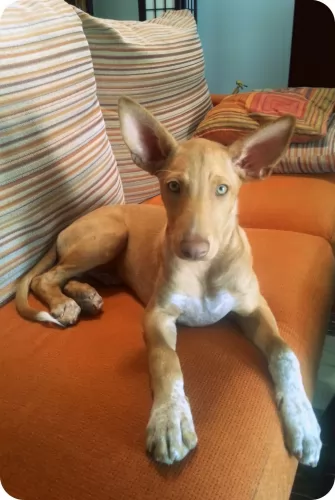 There are three different Andalusian Hounds - small, medium and large, but for the sake of space, we refer to the medium sized dog. The medium sized dog stands at between 42 and 53cm and weighs roughly 20 – 22kg.
There are three different Andalusian Hounds - small, medium and large, but for the sake of space, we refer to the medium sized dog. The medium sized dog stands at between 42 and 53cm and weighs roughly 20 – 22kg.
The dog has short hair, large erect ears and a long tail. Regarding color, most of these dogs are a reddish brown or plain brown color with some having patches of white.
The Andaluz is a dog which is reserved with strangers, but with their owners they are loyal and loving and never aggressive. The Andaluz is considered a one-man dog but he is more than capable of showing love and affection for all members of his human family.
This dog will benefit from training and socialization as this makes him more sure of himself and more obedient. He is an intelligent dog and won’t battle to learn simple commands. You’ll find your Podenco Andaluz to be sweet, calm and gentle indoors with training. He loves to lie close up to you,preferably on the couch right next to you!
 The Lithuanian Hound has always been a dog used for hunting, so he wants to belong to a family where hunting is still practiced or where there is a large garden.
The Lithuanian Hound has always been a dog used for hunting, so he wants to belong to a family where hunting is still practiced or where there is a large garden.
He is smart and easy to train, and what’s more he’s a healthy, robust, low maintenance dog. He’s an amicable dog too, calm, independent and confident, and will make a splendid companion to his human family. He gets on well with children and is willing to share his space with other dogs too.
By choosing the Lithuanian Hound, you’re allowing a wonderful canine friend into your home and heart.
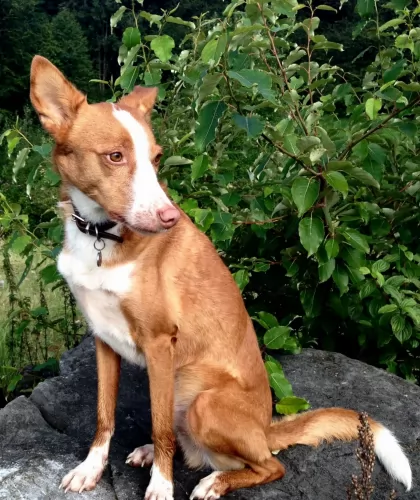 This dog has always been a hunting dog, and an excellent one at that. These days he is also a companion animal. It is very sad that these dogs have been given a cruel deal in Spain.
This dog has always been a hunting dog, and an excellent one at that. These days he is also a companion animal. It is very sad that these dogs have been given a cruel deal in Spain.
For those that make it into a loving home, they have proved to make excellent low maintenance dogs who are willing to provide their human family with faithful love and companionship that only a dog can provide.
 Lithuanian Hounds can reach 12 – 14 years of age when they’re loved and well cared for. You won’t find many medical problems with this robust dog breed, but it pays to know some of the more common dog illnesses.
Lithuanian Hounds can reach 12 – 14 years of age when they’re loved and well cared for. You won’t find many medical problems with this robust dog breed, but it pays to know some of the more common dog illnesses.
This is a genetic condition that affects the hips and which can lead to painful arthritis. Dogs prone to hip and elbow dysplasia always benefit by avoiding obesity.
Deep chested dogs are more prone to Bloat, occurring when gas builds up in the stomach and can’t escape. This is a life threatening illness and immediate medical attention will be required.
 Your Podenco Andaluz is a robust dog breed and doesn’t battle with any health conditions. However, having said that, every dog can battle with some of the more common dog illnesses, and then your dog may well have to visit the vet.
Your Podenco Andaluz is a robust dog breed and doesn’t battle with any health conditions. However, having said that, every dog can battle with some of the more common dog illnesses, and then your dog may well have to visit the vet.
Remember, that to give your dog the best chance, the dog should receive vaccinations to protect him from some life-threatening diseases.
This disease is brought about by the protozoan parasite Leishmania. The dog gets into trouble with this disease when sand-flies transmit parasites into the skin of the dog. The disease spreads to most organs, with kidney failure being the most common cause of death.
This is a fatal disease that is contracted through the bite of an infected mosquito. It is serious and will require veterinary intervention as its a disease that can create problems with the animal’s heart.
This is a fatal viral disease that can be passed on to your pet and affects the central nervous system. A dog with rabies is nearly always a dead dog, sadly. Symptoms include excess drooling, aggression and seizures.
 This energetic dog is going to want a lot of exercise as he has always been a hunting dog. While a long, brisk walk will be excellent for him, he will want more activity than that. He’ll want to be included in all your activities – walks, hikes, camping trips and swimming.
This energetic dog is going to want a lot of exercise as he has always been a hunting dog. While a long, brisk walk will be excellent for him, he will want more activity than that. He’ll want to be included in all your activities – walks, hikes, camping trips and swimming.
A big positive with the beautiful, sleek Lithuanian Hound is that he is looked upon as a low maintenance dog. The short coat will require a good brush down twice a week.
He sheds a couple of times during the year. He’s the kind of dog who thrives on these grooming sessions and it’s a time to check him over for ticks and fleas as well as for odd lumps.
Look inside his ears too, particularly since he is a floppy eared dog. Open his mouth too and keep his teeth brushed and clean. There is special canine toothpaste and toothbrush for this purpose. Never try to use human toothpaste as it can be toxic for your dog.
There are a number of things to consider when it comes to feeding your dog, but it goes without saying that the best, most nutritious food will ensure health and longevity.
If you feed your pet commercially manufactured pet food, use the feeding guidelines found on the packaging labelling. With any new food types you give your dog, keep an eye on him for reactions.
Your dog’s metabolism and energy levels as well as his age will determine how much to feed him.
There are many excellent dog foods available – choose an excellent one and make sure to feed your dog some tasty, nutritious home-made food too.
You can’t go wrong with some cooked chicken, brown rice or pasta and some raw and cooked vegetables. Chop up and add to his dry kibble from time to time and he’ll be happy and healthy. Raw meat is expensive but try and include some every now and then as it contributes to allergy-free skins, bright eyes, shiny coats, wet noses and wagging tails.
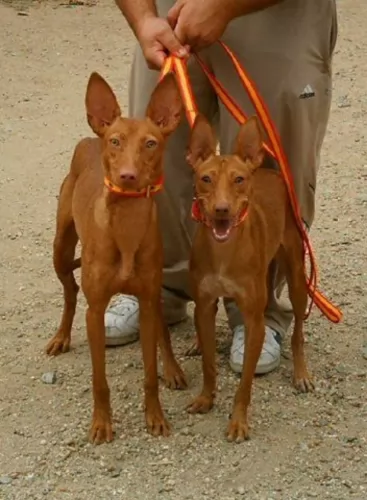 This has always been a hunting dog so he is used to running long distances. He is best suited to life in the countryside as opposed to life on a small property in the city. You will certainly need to take him on walks. If you are lucky enough to live near the beach, you can take bat and ball and hit the ball hard with the beach-bat, allowing your dog to race at top speed to fetch it.
This has always been a hunting dog so he is used to running long distances. He is best suited to life in the countryside as opposed to life on a small property in the city. You will certainly need to take him on walks. If you are lucky enough to live near the beach, you can take bat and ball and hit the ball hard with the beach-bat, allowing your dog to race at top speed to fetch it.
Regular brushing, at least twice a week will be required for the Podenco Andaluz. It’s a good idea to check your dog over for any odd lumps and for ticks and fleas. Keep his nails trimmed and check his ears and eyes for infection.
Every dog requires a good diet if good health and longevity are to be expected. Always check the labels of commercially manufactured dog foods to ensure that your dog gets a good dose of protein in.
The best quality foods have a good balance of vitamins and minerals in them, whereas some of the poorer quality foods have bad ingredients such as preservative, colorants and fillers.
Try and give your dog some wholesome home-made food such as boiled chicken, brown rice or pasta, sweet potatoes, spinach and carrots. Also, some raw meat occasionally will benefit your dog too, after all dogs have always been carnivores.